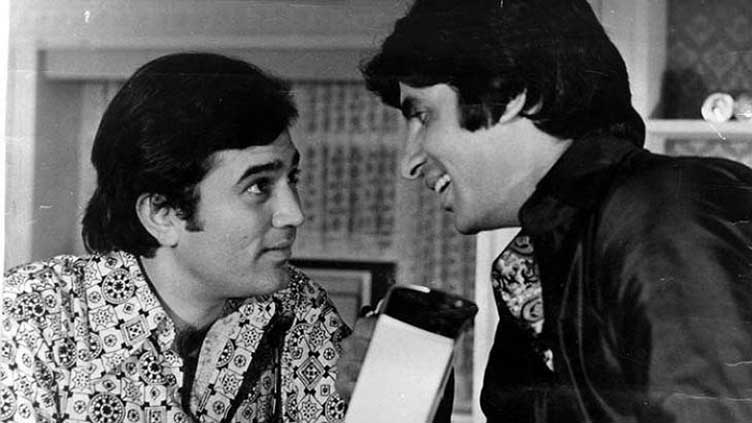Rajesh Khanna passed the baton to Amitabh Bachchan with Namak Haraam: 'I knew my time was up'

Entertainment
Rajesh Khanna passed the baton to Amitabh Bachchan with Namak Haraam: 'I knew my time was up'
MUMBAI, (ONLINE) - When Rajesh Khanna and Amitabh Bachchan worked together for the first time in Hrishikesh Mukherjee’s Anand in 1971, one was a star and the other was a fairly new actor who was still trying to find his niche. Two years later, in 1973, the tables had turned.
Amitabh Bachchan was on the cusp of superstardom and Rajesh Khanna wass losing his Midas touch. The film that made this change in their dynamic obvious to the world was Mukherjee’s Namak Haraam.
For the unversed, Namak Haraam is the story of a middle-class Somu, played by Khanna, and a rich industrialist’s son Vicky, played by Bachchan. The best friends live in a class-less bubble but the world around them can only see the difference in their economic background.
As the economics of the world finds its way into their friendship, Vicky and Somu fall apart. The friends who sang songs of friendship to each other with love, resort to name calling and Vicky considers Somu to be a ‘namak haraam’ (disloyal).
In a significant scene, Vicky’s father, played by Om Shivpuri, explains to him that to run a successful business, one has to make sure that the employees are never united. Vicky finds this idea extremely bizarre so his father elaborates. Giving examples of how politicians govern the country, or how wars across the world are fought – the man says that “divide and rule” is the only way to successfully suppress people and rule them. Bachchan’s Vicky is left aghast and calls this practice “anti-national.” Watching this scene in 2022 made me wonder how frequently and loosely this phrase is used colloquially. The idea of being ‘anti-national’ was associated with being dishonest and manipulative, as opposed to how it is used now. Gulzar’s (who wrote the dialogues) choice of words are so fascinating in the scene that you can visibly see Vicky losing his grip on what he believed to be real. In a later scene, when Rajesh’s Somu tells Vicky that he can’t go back to living in their class-less bubble, Vicky’s agitation is even more evident as he can finally see the insurmountable difference between their worlds that came into being because they too are victims of ‘divide and rule’.
Somu’s struggles and experiences are reflected in his actions but Vicky’s experiences take the form of internal angst – which was pretty on brand for Big B at the time. The scene where he challenges the entire colony for a fight is Amitabh channeling his finest ‘angry young man’ mode. Namak Haraam released around the same time as Zanjeer and in many ways, Somu is the precursor to many of Bachchan’s Vijays that came after.
In the years since, Namak Haraam has been seen as a commentary on class conflict. Some have even seen this as a love story between Somu and Vicky, but for ardent viewers of cinema, this film signifies that transitional moment where Bachchan established that there was no one in the movies who could stand next to him and be just as impressive. “When I saw Namak Haram at a trial at Liberty cinema. I knew my time was up. I told Hrishida, ‘Here is the superstar of tomorrow’,” said Rajesh Khanna in an interview with Movie magazine.
It has been said that the film’s original ending had Amitabh’s character dying but Rajesh demanded that it should be his character who dies for he had seen the sympathy one can get out of the audience with an impactful death scene, like in Anand. And since he was the bigger superstar, he got what he wanted. This particular anecdote is unsubstantiated and does not ring true as the film’s ending is pretty much in line with its original source material, the 1964 film Becket starring Richard Burton and Peter O’Toole.
Unlike the many other ‘middle-of-the-road’ films that Mukherjee was known for, Namak Haraam was as mainstream as he ever got. While the ethos of the film is in sync with Mukherjee’s style of cinema, the execution makes the audience wonder if the filmmaker was aware that he is working with the two biggest superstars that Hindi cinema would ever see, and that possibly made the film a bit more over-the-top than what we otherwise saw in his films.

